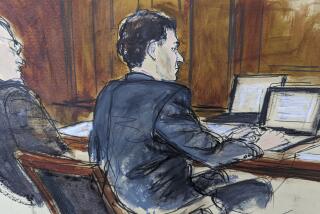Auditor Talks at Scrushy Trial
- Share via
HealthSouth Corp. auditors assumed former Chief Executive Richard Scrushy had a good understanding and overwhelming control of what was going on at the company, a former auditor testified Tuesday at the fired chief executive’s corporate fraud trial in Birmingham, Ala.
James Lamphron of Ernst & Young testified that Scrushy signed a letter to auditors guaranteeing the validity of 2001 financial statements that later were found to be fraudulent.
“If he wouldn’t sign that letter, I wouldn’t have signed off on the audit,” said Lamphron while being cross-examined by prosecutors.
Prosecutors say Scrushy, founder of the medical services chain, directed a scheme to overstate HealthSouth earnings by about $2.7 billion for seven years starting in 1996.
The defense blames the fraud on 15 former HealthSouth executives who have pleaded guilty and are cooperating with the government. Scrushy attorney Donald Watkins pointed out Tuesday that auditors relied on information from those 15, and he asked Lamphron whether Scrushy might have relied on the same information.
“I have no knowledge of what was shared with Mr. Scrushy,” he said.
Lamphron, responding to questions from Watkins, also testified that he mainly reviewed financial documents with former Chief Financial Officers Bill Owens and Weston Smith, not Scrushy. But he said Ernst & Young, HealthSouth’s outside auditor, assumed that Owens and Smith discussed the financial material with Scrushy.
He said Scrushy never relayed to auditors the substance of a conversation Scrushy had with Owens on March 18, 2003, which Owens secretly recorded and in which Owens mentioned his wife’s concerns about fraud. Lamphron said auditors also were not told about Smith’s refusal to sign a financial statement in 2002.
“Obviously that would be very significant to us,” Lamphron said.
Scrushy, the first CEO charged with violating the Sarbanes-Oxley corporate reporting law, also is accused of conspiracy, fraud, money laundering and obstruction. If found guilty, he could receive the equivalent of a life sentence and be ordered to forfeit $278 million in assets.
More to Read
Inside the business of entertainment
The Wide Shot brings you news, analysis and insights on everything from streaming wars to production — and what it all means for the future.
You may occasionally receive promotional content from the Los Angeles Times.








